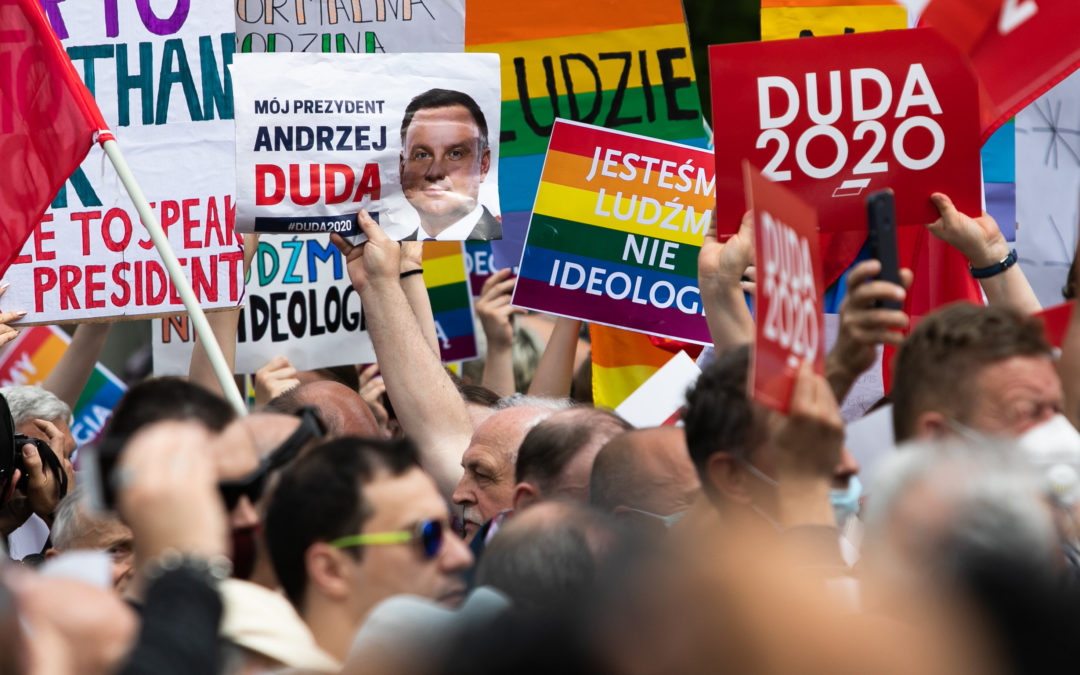In a further campaign speech warning of the dangers of the LGBT movement, President Andrzej Duda has referred to an “ideology of evil”, quoting words by Polish Pope John Paul II.
Meanwhile, a vice president of the European Commission has become the first senior EU official to criticise the Polish president’s recent anti-LGBT rhetoric. “It is very sad in modern Europe” to see “top-level politicians targeting minorities to achieve political goals”, says Věra Jourová.
Speaking at a campaign rally in the eastern city of Lublin today, Duda told the crowd that he wanted to recall the words of the late pope, who was a “moral authority not only for us, but for the whole world”.
He then quoted from a 2005 book by John Paul II, saying that “pressure for homosexual relationships to be recognsied as a different form of family, which are also entitled to the right to adopt”, is “a violation of God’s law” and an “ideology of evil…seeking to use human rights against humanity and the family”.
Prezydent Andrzej Duda: „Można, a nawet trzeba się zapytać, czy tu nie działa również jakaś inna jeszcze »ideologia zła«, w pewnym sensie głębsza i ukryta, usiłująca wykorzystać nawet prawa człowieka przeciwko człowiekowi oraz przeciwko rodzinie”#wieszwięcej pic.twitter.com/Xgp6xP3WQ7
— portal tvp.info 🇵🇱 (@tvp_info) June 15, 2020
During his speech, the president also responded to criticism he received over the weekend for anti-LGBT remarks. “I have [faced] ideologically motivated attacks… from the West and at home” simply for “not consenting to the smuggling of ideological content into schools”, said Duda.
But, again quoting John Paul II, Duda said “I am not afraid and I will not be afraid, and you too [should] not be afraid”, reports TVP Info.
“We cannot allow our family to be taken away; we must protect it with all our strength,” continued the president. “We must survive this ideological hurricane.”
The president also responded to protesters who had come to the event holding LGBT flags: “I assure my compatriots who stand here beneath rainbow flags that, although we differ, because I stand beneath the white-and-red flag [of Poland], that does not stop us from respecting one another.”
Wiecowi A. Dudy w Lublinie towarzyszyła pikieta – protest przeciwko homofobicznej kampanii władzy.
Niedawno prezydent poparł posła Żalka, który mówił, że „LGBT to nie ludzie, to ideologia”. Lubelski poseł PiS, P. Czarnek powiedział, że „ci ludzie nie są równi ludziom normalnym”. pic.twitter.com/4q3CCowGJI— Jerzy Bokłażec (@boklazec) June 15, 2020
Duda last week signalled that anti-LGBT rhetoric would become a feature of his reelection bid by publishing a “Family Charter” of campaign promises. These included pledges to “defend children from LGBT ideology” as well as to prevent same-sex marriage and adoption.
That was followed on Saturday by a speech in which the president described LGBT as a form of “neo-Bolshevism” that is “smuggled into schools” to “sexualise children”, and which is “even more dangerous to man [than] communist ideology”.
“They try to tell us that [LGBT] are people, but it is an ideology,” said Duda, who as “evidence” of this pointed to the fact that “some people who have homosexual preferences don’t identify with this [LGBT] movement”.
The protesters at the president’s speech in Lublin this morning chanted: “We are people, not an ideology.” There were some minor scuffles with Duda’s supporters, with one attempt to pull down a rainbow banner, reports TVN24.
Duda’s recent remarks have drawn criticism from opponents at home but also support from many fellow conservatives. On Saturday evening, an MP from the ruling Law and Justice (PiS) party, from which Duda hails, said that “these [LGBT] people are not equal to normal people”.
“Let’s stop listening to this idiocy about human rights or equality,” said Przemysław Czarnek on state broadcaster TVP. “Let’s defend families from this type of corruption and depravity, from LGBT ideology.”
Duda’s comments also attracted attention from around the world, leading the president to claim yesterday evening that his words had been deliberately taken out of contex. Foreign media are spreading “fake news” as part of a “dirty political fight”, he tweeted in English.
President Duda accuses international media of "fake news" for distorting his words about "LGBT not being people" and being "more dangerous than communism".
I've not seen any media misquote him. In the thread below I'll translate his speech and you can make up your own mind pic.twitter.com/oDguavATC3
— Daniel Tilles (@danieltilles1) June 14, 2020
Today, European Commission Vice President Věra Jourová became the first senior EU official to respond to the Polish president’s recent anti-LGBT remarks.
“I do not want to interfere in the election campaign,” said Jourová, quoted by Interia. “But I think it is very sad that, in modern Europe, top-level politicians have decided to target minorities to achieve potential political goals.”
“I would remind you that, according to EU law and the Polish constitution, everyone is equal irrespective of their race, religion or sexual orientation,” she continued, adding that “politicians should take responsibility for their language” because ” it can have consequences in real life”.
Yesterday, former Belgian prime minister Elio Di Rupo called on the EU to take action against Poland over Duda’s “open homophobia” and “extraordinary aggression”.
He called for the European Commission to launch Article 7 proceedings against Poland, which can result in the suspension of EU voting rights, and to make European funding contingent on respect for European values and fundamental freedoms.
J’invite la @EU_Commission et @dreynders à demander au Conseil l’activation de l’article 7 du Traité de l’UE permettant une suspension du droit de vote. De plus, toute aide européenne devrait être soumise au respect des valeurs européennes et libertés fondamentales.
— Elio Di Rupo (@eliodirupo) June 14, 2020
Main image credit: Jakub Orzechowski / Agencja Gazeta

Daniel Tilles is editor-in-chief of Notes from Poland. He has written on Polish affairs for a wide range of publications, including Foreign Policy, POLITICO Europe, EUobserver and Dziennik Gazeta Prawna.




















